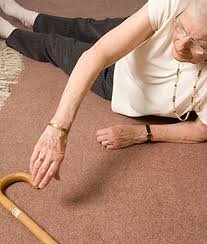Depression Drugs ‘Causing Falls’
by BBC News Health:
Elderly people with dementia are more likely to suffer falls if they are given anti-depressants by care home staff, a study claims.Many dementia patients also suffer from depression and drugs known as selective serotonin uptake inhibitors (SSRIs) are frequently prescribed. But the British Journal of Clinical Pharmacology reports that the risk of injuries from falls was tripled.The Alzheimer's Society called for more research into alternative treatments.The risk of falls following treatment with older anti-depressants is well established, as the medication can cause side effects such as dizziness and unsteadiness. It had been hoped that a move to newer SSRI-type drugs would reduce this problems, but the latest research, from the Erasmus University Medical Center in Rotterdam, appears to show the reverse.'Worrying'Dr Carolyn Sterke recorded the daily drug use and records of falls in 248 nursing home residents over a two-year period.The average age of the residents was 82, and the records suggested that 152 of them had suffered a total of 683 falls. The consequences of falls were relatively high, with 220 resulting in injuries including hip fractures and other broken bones - and one resident died following a fall.
The risk of having an injury-causing fall was three times higher in residents taking SSRIs compared with those not taking the drug, and this risk rose further if the patient was being given sedative drugs as well.Dr Sterke said that these risks needed to be taken into account when assessing whether anti-depressants were required.She said: "Physicians should be cautious in prescribing SSRIs to older people with dementia, even at low doses."
Professor Clive Ballard, from the Alzheimer's Society, said it was "worrying" that such a commonly prescribed anti-depressant was causing increased risk. He said: "It is important to highlight any aspect of care that might be causing risk to a person with dementia. We want to ensure that people with the condition are always receiving the best care possible."More research is now needed to understand why this anti-depressant is having this effect on people with dementia and if there is an alternative treatment for depression that they could be prescribed. "One in three people over 65 will die with dementia yet research into the condition continues to be drastically underfunded. We must invest now."

